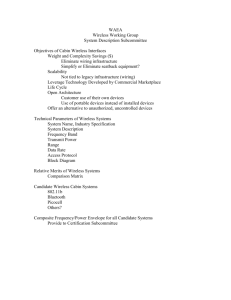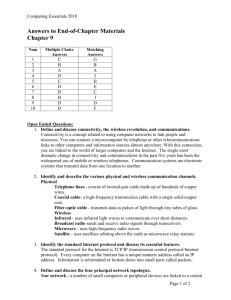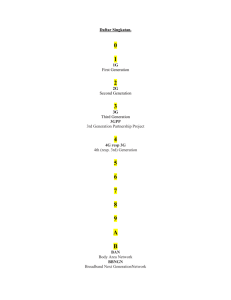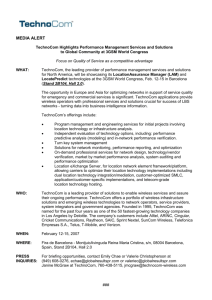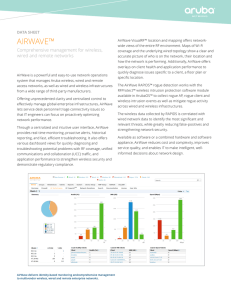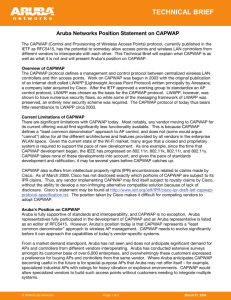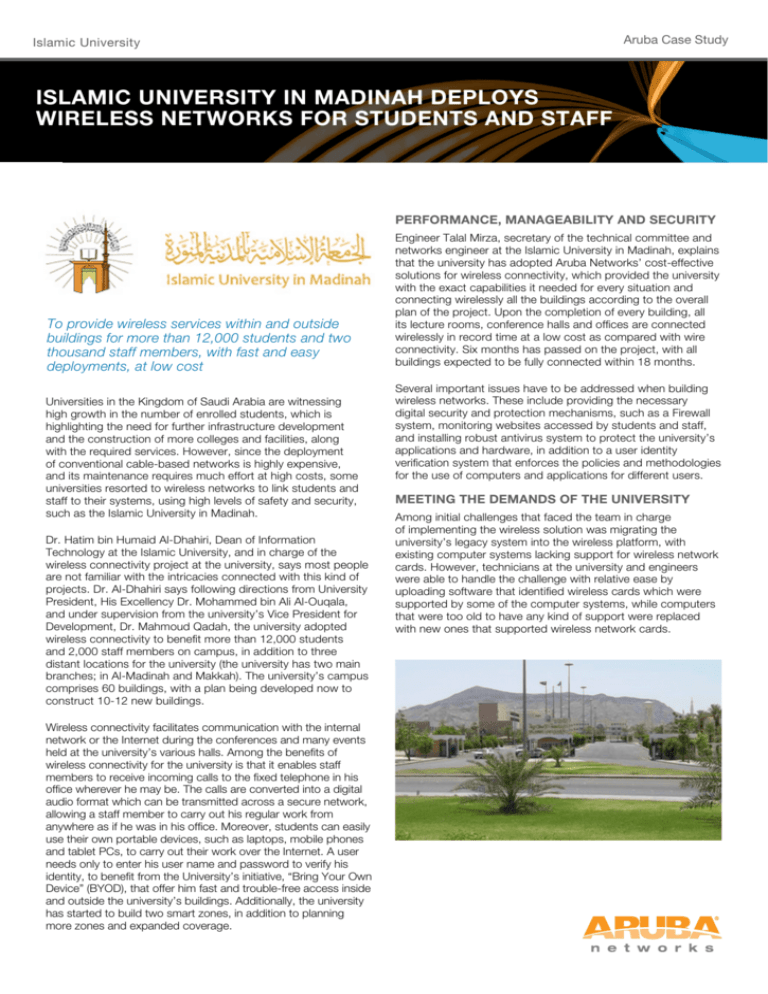
Aruba Case Study
Islamic University
Islamic University in Madinah deploys
wireless networks for students and staff
Performance, manageability and security
To provide wireless services within and outside
buildings for more than 12,000 students and two
thousand staff members, with fast and easy
deployments, at low cost
Universities in the Kingdom of Saudi Arabia are witnessing
high growth in the number of enrolled students, which is
highlighting the need for further infrastructure development
and the construction of more colleges and facilities, along
with the required services. However, since the deployment
of conventional cable-based networks is highly expensive,
and its maintenance requires much effort at high costs, some
universities resorted to wireless networks to link students and
staff to their systems, using high levels of safety and security,
such as the Islamic University in Madinah.
Dr. Hatim bin Humaid Al-Dhahiri, Dean of Information
Technology at the Islamic University, and in charge of the
wireless connectivity project at the university, says most people
are not familiar with the intricacies connected with this kind of
projects. Dr. Al-Dhahiri says following directions from University
President, His Excellency Dr. Mohammed bin Ali Al-Ouqala,
and under supervision from the university’s Vice President for
Development, Dr. Mahmoud Qadah, the university adopted
wireless connectivity to benefit more than 12,000 students
and 2,000 staff members on campus, in addition to three
distant locations for the university (the university has two main
branches; in Al-Madinah and Makkah). The university’s campus
comprises 60 buildings, with a plan being developed now to
construct 10-12 new buildings.
Wireless connectivity facilitates communication with the internal
network or the Internet during the conferences and many events
held at the university’s various halls. Among the benefits of
wireless connectivity for the university is that it enables staff
members to receive incoming calls to the fixed telephone in his
office wherever he may be. The calls are converted into a digital
audio format which can be transmitted across a secure network,
allowing a staff member to carry out his regular work from
anywhere as if he was in his office. Moreover, students can easily
use their own portable devices, such as laptops, mobile phones
and tablet PCs, to carry out their work over the Internet. A user
needs only to enter his user name and password to verify his
identity, to benefit from the University’s initiative, “Bring Your Own
Device” (BYOD), that offer him fast and trouble-free access inside
and outside the university’s buildings. Additionally, the university
has started to build two smart zones, in addition to planning
more zones and expanded coverage.
Engineer Talal Mirza, secretary of the technical committee and
networks engineer at the Islamic University in Madinah, explains
that the university has adopted Aruba Networks’ cost-effective
solutions for wireless connectivity, which provided the university
with the exact capabilities it needed for every situation and
connecting wirelessly all the buildings according to the overall
plan of the project. Upon the completion of every building, all
its lecture rooms, conference halls and offices are connected
wirelessly in record time at a low cost as compared with wire
connectivity. Six months has passed on the project, with all
buildings expected to be fully connected within 18 months.
Several important issues have to be addressed when building
wireless networks. These include providing the necessary
digital security and protection mechanisms, such as a Firewall
system, monitoring websites accessed by students and staff,
and installing robust antivirus system to protect the university’s
applications and hardware, in addition to a user identity
verification system that enforces the policies and methodologies
for the use of computers and applications for different users.
Meeting the demands of the University
Among initial challenges that faced the team in charge
of implementing the wireless solution was migrating the
university’s legacy system into the wireless platform, with
existing computer systems lacking support for wireless network
cards. However, technicians at the university and engineers
were able to handle the challenge with relative ease by
uploading software that identified wireless cards which were
supported by some of the computer systems, while computers
that were too old to have any kind of support were replaced
with new ones that supported wireless network cards.
Aruba Case Study
Islamic University
Commenting on the use of wireless networks, Engineer
Ammar Enaya, General Manager Middle East and Turkey at
Aruba Networks, says the adoption of wireless technologies
at universities facilitates expansion and the offering of more
innovative services to its staff and students at much lower costs
than connecting buildings with network cables – not to mention
the relative speed at which work can be completed and the
higher levels of security provided. He says wireless solutions
enable students and staff to bring their personal devices to
campus and use them in a safe, practical and comfortable
manner that allows the devices to be registered, monitored and
prevented from accessing harmful websites.
Expanding partnership With Aruba
Engineer Enaya points out that the Islamic University in Madinah
will use virtual private networks (VPNs), which provide high
security for data transfer through encryption technologies. The
wireless solution will also be supported by Remote Access
Points (RAP), ClearPass Access Management, and AirWave
Network Management solutions. The university is also working
closely with the company developing the technology to deploy
POP solution for AmigoPOD in order to offer the university’s
visitors and guests secure Internet access. The university
currently uses 105 Series internal access points to cover
the university’s buildings internally, while 175 Series is used
for external access points to cover the university’s external
locations, with Aruba 3000 Series Mobility Controllers are used,
followed by series 6000.
www.arubanetworks.com
1344 Crossman Avenue. Sunnyvale, CA 94089
1-866-55-ARUBA | Tel. +1 408.227.4500 | Fax. +1 408.227.4550 | info@arubanetworks.com
© 2012 Aruba Networks, Inc. Aruba Networks’ trademarks include AirWave®, Aruba Networks®, Aruba Wireless Networks®, the registered Aruba the Mobile Edge Company logo, Aruba Mobility
Management System®, Mobile Edge Architecture®, People Move. Networks Must Follow®, RFProtect®, and Green Island®. All rights reserved. All other trademarks are the property of their
respective owners. CS_IslamicUniversity_A4_110212

